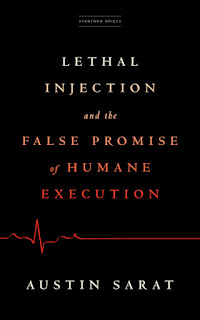 Gruesome Spectacles: Botched Executions and America's Death Penalty (2014) and The Death Penalty on the Ballot (2019).
Gruesome Spectacles: Botched Executions and America's Death Penalty (2014) and The Death Penalty on the Ballot (2019).
Sarat applied the “Page 99 Test” to his new book, Lethal Injection and the False Promise of Humane Execution, and reported the following:
Page 99 does not offer a particular insight into the whole of the book. It discusses one particular way in which states have responded to lethal injection's increasing problems. Three states, Arizona, Idaho and Oklahoma, include provisions in their execution protocols instructing officials what to do if a condemned inmate goes into cardiac arrest while being prepared for the execution. Those provisions instruct them that they should provide medical assistance and keep the inmate alive so the state can kill them on its terms. This is one of the most bizarre aspects of America's death penalty system.Learn more about Lethal Injection and the False Promise of Humane Execution at the Stanford University Press website.
My book offers many insights into the bizarre and often unusual world of lethal injection. But its real purpose is to offer both a short history of this execution method and its current status. That history shows that instead of being carefully designed, well thought out, the development of lethal injection was slipshod and unscientific. That is one of the reasons it has proven to be America's least reliable and most problematic execution method.
The problems with lethal injection have increased dramatically in the last decade as states have experimented with new drugs and drug cocktails. And, as they have encountered new problems, states have improvised and given officials responsible for carrying out executions either detailed instructions of the kind discussed on page 99 or enormous discretion with which to keep the machinery of death running.
My book exposes the illusory quality of this country's search for a humane method of execution.
The Page 99 Test: Gruesome Spectacles: Botched Executions and America's Death Penalty.
--Marshal Zeringue



